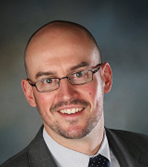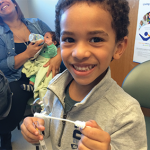Dr. Baraf is renowned for his expertise in practice management and has lectured and written widely on ways to maintain a healthy practice. His work in clinical research, especially in the management of gout, has played an important role in the advancement of the specialty. He has also presented his work on gout, rheumatoid arthritis, osteoarthritis, ankylosing spondylitis and the safety of non-steroidal anti-inflammatory drug therapy in dozens of peer-reviewed publications and at national and international meetings.
In 2014, Dr. Baraf was recognized for his work by the ACR when he was awarded the Paulding Phelps Award for “outstanding service to patients, community, and the practice of medicine.” At ACR Convergence 2022 he received the Innovation in Clinical Care Award.
Since his retirement, Dr. Baraf continues to keep a busy calendar, retaining his appointment as a clinical professor of medicine at George Washington University and teaching rheumatology fellows at the National Institutes of Health, where he advises young rheumatologists to keep their options open. During his own fellowship, he says,
“I wouldn’t have predicted my career trajectory. You never know where your interests and abilities will take you.”
Mathieu Nelessen Named CARRA CEO
In January, Mathieu Nelessen became CEO of the Childhood Arthritis and Rheumatology Research Alliance (CARRA), a network that formed in 2002. Mr. Nelessen comes to CARRA following an active career with several well-established nonprofit organizations. He spent a decade with the American Red Cross, beginning with the New Jersey chapter and recently having served as vice president of business strategy and planning, biomedical services. He previously was executive director of the New Jersey Chapter of the American Diabetes Association and has also served with the Special Olympics.
We spoke with Mr. Nelessen in December 2022, as he was preparing to take the reins as CEO. “It’s absolutely thrilling,” he said of his new post, “and the most compelling aspect of
CARRA for me, personally, is its focus on very specific and rare pediatric rheumatic diseases. My time at the Special Olympics helped me to bring deep attention to a singular mission.”
Mr. Nelessen’s quest as he embarks on his new appointment is to “listen and learn and try to deeply understand what is the ‘art of the possible.’” His initial “listening tour” included familiarizing himself with the realities of the pediatric rheumatology field.
According to the ACR, over 300,000 children are affected by these diseases, and yet, as Christy Sandborg, MD, professor of pediatrics (rheumatology) emerita, Stanford Medicine Children’s Health, has pointed out, only 60% of medical schools have a pediatric rheumatologist. From its formation, CARRA has focused on addressing the unmet needs of children with rheumatic disease. Its network supports investigator-initiated studies to help build an evidence base for effective care. The CARRA registry includes 72 CARRA sites and has enrolled over 10,000 children with rheumatic disease (i.e., juvenile idiopathic arthritis, systemic lupus erythematosus, juvenile dermatomyositis) since reopening in July 2015.


